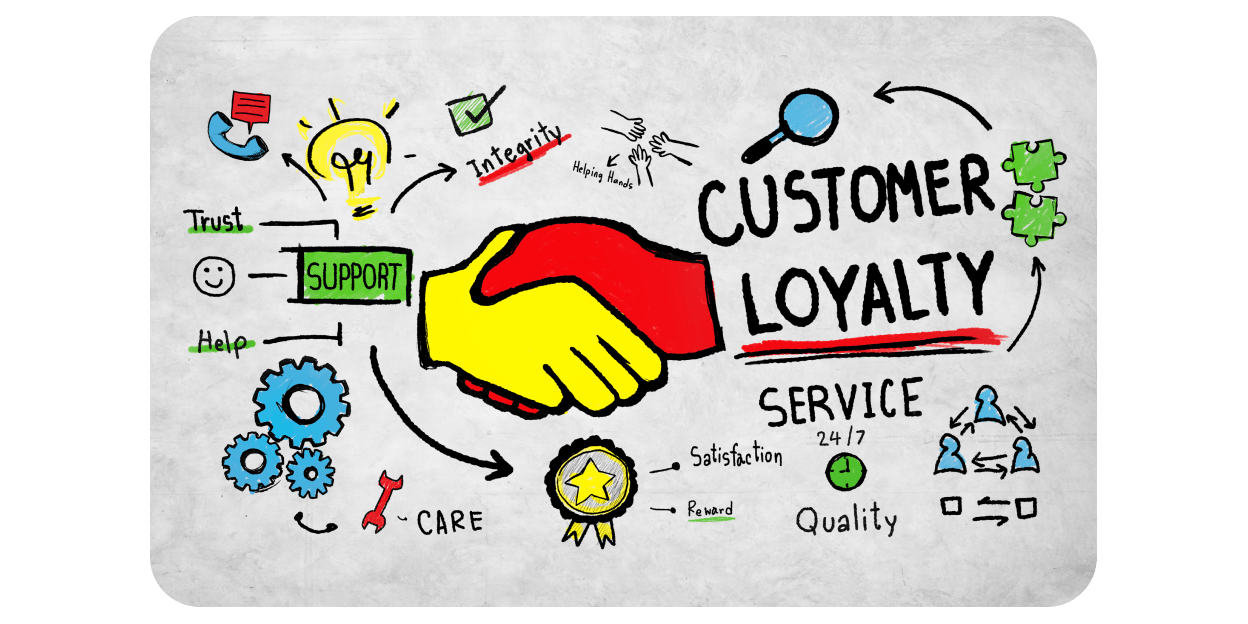In the fast-paced business environment, customer loyalty is a key factor for success. The importance of loyal customers in improving your profits is clear, as even a small 5% increase in customer retention can boost overall profits by 25% to 95%. If you can cultivate a relationship with your customers, you are looking at a transformative boost to your performance and, ultimately, your profits.
In this guide, we'll share eight effective strategies to build customer loyalty, especially in a constantly changing consumer landscape.
Why customer loyalty matters
Understanding the significance of customer loyalty is paramount in appreciating its pivotal role in your business's success. Let's delve into why customer loyalty matters and the profound impact it can have on your organisation:
- Financial Benefits: Customer loyalty is a direct driver of your financial health. Loyal customers are a stable and consistent source of revenue and tend to spend more over their lifetime, contributing significantly to your bottom line.
- Attracting New Business: Loyal customers are not just valuable for their own transactions; they play a pivotal role in attracting new business. Positive word-of-mouth recommendations from satisfied customers can lead to new customer acquisitions. First-time customers are often introduced to your brand through recommendations from friends, family, or colleagues who have had excellent experiences.
Customer loyalty serves as the cornerstone of a thriving business, enhancing financial stability, promoting growth, and perpetuating a cycle of satisfaction that draws new customers into your fold. Understanding its profound impact is essential for crafting strategies to effectively cultivate and maintain customer loyalty.
1. Understanding your customer’s priorities
It's imperative to understand your clientele to foster lasting customer loyalty. By delving deep into their preferences and priorities, you can curate an experience that resonates with them on a profound level. Here are key elements to consider:
- Personalised service: Customers appreciate when you recognise and cater to their unique needs. Address them by their names, anticipate their preferences, and tailor your offerings accordingly.
- Recognition: Acknowledge the loyalty of your customers. Celebrate milestones in their journey with your brand and express your gratitude. Small gestures of recognition can go a long way.
- Ethical policies: Align your business practices with ethical values. Customers increasingly gravitate towards brands that demonstrate a commitment to social and environmental responsibility. Show them that you share their principles.
- Brand activism: Engage with causes that matter to your customers. Championing social or environmental issues can create a deep emotional connection and demonstrate your brand's commitment to making a positive impact.
- Frictionless tech interactions: Streamline digital interactions. Ensure that your online platforms are user-friendly and hassle-free, offering a seamless experience across various devices and touchpoints.
2. Mapping the Customer Journey
Understanding the steps your customers take when making a purchase is pivotal in creating a memorable and satisfying experience.
- Prioritising human interaction: Treat your customers as individuals, not just transactions. Ensure that each touchpoint, whether in-store or online, reflects a human-centric approach. This involves attentive and empathetic customer service, actively listening to their needs, and offering personalised assistance.
- Smooth buying experience: Strive for seamlessness in the purchasing process. Whether your customers engage with your brand in a physical store or through digital channels, ensure that their journey is free from unnecessary complications. Simplify the steps they must take to access your products or services.
3. Seamless Multi-Channel Integration
This strategy empowers customers to interact with your brand on their terms, creating a cohesive and immersive experience that encourages repeat business.
- Customer-centric engagement: Omnichannel integration revolves around the customer's convenience and preferences. It acknowledges that customers may choose various channels — whether in-store, online, via social media, or through mobile apps — to interact with your brand. By offering a consistent experience across these channels, you ensure that customers can engage with you in ways that suit them best.
- Enhanced convenience: Simplify the path to purchase. An omnichannel approach eliminates friction and confusion, making it easy for customers to navigate between different touchpoints. When customers can seamlessly transition from researching products online to making a purchase in-store, or vice versa, you enhance their overall experience.
- Encouraging loyalty: By accommodating customers across their preferred channels, you demonstrate your commitment to their needs. This not only fosters brand loyalty but also encourages repeat business. Customers appreciate the flexibility and convenience that an omnichannel strategy provides.
4. Adapting to the modern support landscape:
Traditional support channels are shifting, making it essential to explore more effective avenues such as live chat support and other digital options. These adaptations not only enhance customer satisfaction but also significantly reduce response times.
- Real-time assistance: Live chat support offers customers immediate access to assistance. It allows them to seek help and resolve issues in real time, which is increasingly important in a world where instant gratification is the norm. This real-time assistance can lead to higher customer satisfaction.
- Efficiency and convenience: Digital support options are often more efficient for both customers and businesses. They reduce the wait times associated with traditional support methods and streamline the problem-solving process. Customers appreciate the convenience of resolving issues without long phone queues or email exchanges.
- Data-driven insights: Digital support channels provide valuable data that can be analysed to track common issues and tailor support more effectively. By understanding customer pain points, you can proactively address concerns, further enhancing their experience.
5. Soliciting and Valuing Feedback
To foster unwavering customer loyalty, you need to actively seek feedback from your customers, leveraging their insights to enhance your products, services, and overall brand experience.
- Encourage customer feedback: Make it easy for customers to share their thoughts and experiences. Actively solicit feedback through surveys, suggestion boxes, or feedback forms. By inviting their input, you demonstrate a genuine interest in their opinions.
- Utilise feedback for improvement: Act on the feedback you receive. Analyse the data, identify trends, and address recurring issues. When customers see that their suggestions result in tangible improvements, they are more likely to remain loyal to your brand.
- Engage with reviews: Monitor and respond to customer reviews, both positive and negative. Acknowledge positive feedback with gratitude and humility. For negative reviews, respond professionally, and offer solutions or resolutions. Publicly addressing reviews showcases your commitment to resolving issues and maintaining high standards.
- Showcase your commitment: Share stories of how customer feedback has led to positive changes within your organisation. Use these narratives to highlight your dedication to excellence and customer satisfaction.
6. Effective social media engagement
In the digital age, mastering effective social media engagement is a pivotal strategy for nurturing lasting customer loyalty. Understanding your audience and utilising platforms like Twitter can help you forge meaningful relationships with your customers.
- Know your audience: Dive deep into the demographics, interests, and behaviours of your social media followers. Understanding who your audience is will enable you to create content that resonates with them.
- Personalisation matters: Use the insights you gather to personalise your interactions. Address individual customers by name, respond to their comments and inquiries promptly, and tailor your content to their interests.
- Build relationships: Social media provides an opportunity to build genuine relationships with your customers. Engage in conversations, respond to feedback, and acknowledge their loyalty. Building a rapport with your audience can lead to stronger brand affinity.
- Adapt to online behaviour: Recognise the specific online behaviours of your customers on different platforms. For instance, on Twitter, being concise and engaging is crucial due to character limits. Tailor your content to match the platform's unique dynamics.
7. Showcasing beliefs and values
In an era where customers are making conscious choices about the brands they support, aligning your business with causes or values that resonate with your target audience can be a powerful strategy for building lasting customer loyalty.
- Reflecting ethical concerns: Customers, especially younger generations, are increasingly drawn to brands that share their ethical concerns and values. When your business aligns with these principles, you become a more attractive choice for customers who want their purchases to reflect their beliefs.
- Building emotional connections: Supporting a cause or championing certain values can evoke strong emotions in your audience. When customers connect with your brand on a deeper emotional level, they are more likely to remain loyal and advocate for your business.
- Differentiating your brand: Demonstrating a commitment to causes or values sets your brand apart from competitors. It creates a unique selling proposition that can attract customers seeking more than just products or services – they seek a sense of purpose and alignment with their own convictions.
8. Authenticity in Marketing
As you navigate the landscape of marketing, particularly in relation to social justice issues, authenticity should be your guiding principle. It's crucial to exercise caution and ensure that your marketing campaigns align with your messaging and genuinely benefit specific communities or groups.
- Avoiding tokenism: Inauthentic use of social justice issues in marketing can lead to accusations of tokenism or "greenwashing." Customers are quick to discern when a brand's actions do not match its messaging, which can erode trust and damage your reputation.
- Benefiting communities: Any marketing campaign centred on social justice should genuinely contribute to the betterment of the communities or groups it seeks to support. Authentic actions that make a positive impact demonstrate your commitment to meaningful change.
- Enhancing reputation: Authenticity in marketing builds a strong and positive reputation. It reflects your brand's integrity, transparency, and dedication to making a difference beyond profit motives.
Through the adoption of these eight strategies and an unwavering commitment to comprehending the evolving needs of your customers, you can lay a robust foundation for the cultivation of lasting customer loyalty and the sustained growth of your business.
Remember that building and maintaining customer loyalty is not a one-time endeavour but an ongoing process. By consistently nurturing your customer relationships, personalising experiences, and aligning with their values, you can forge connections that endure, creating a customer base that not only stays but actively champions your brand.
Build loyal customers with Feefo
Now that you've gained insights into the strategies for building customer loyalty, we encourage you to take action within your own business. Implement these strategies thoughtfully and strategically to create lasting bonds with your customers.
To learn more about building and fostering customer loyalty, get in touch with our team of experts at Feefo today.


